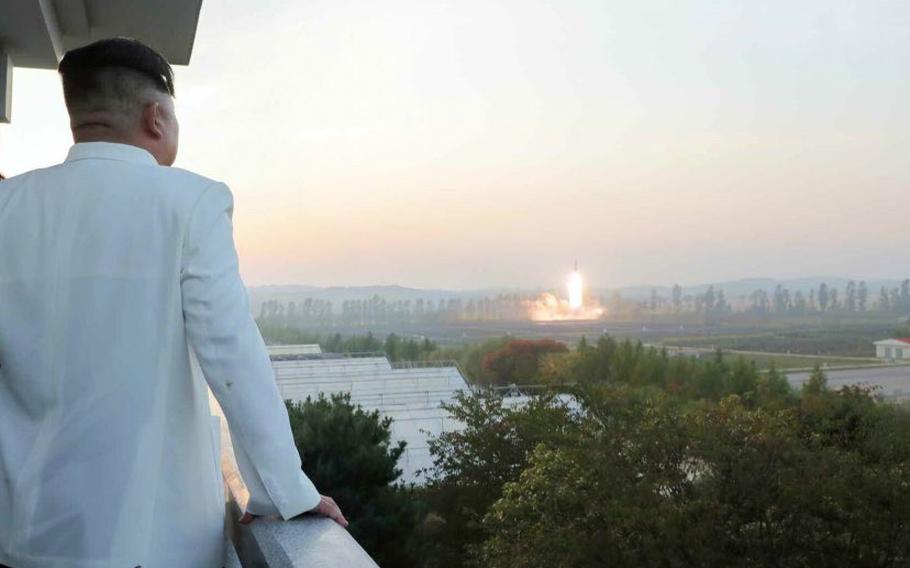
North Korean leader Kim Jong Un watches a missile launch in this image released by the Korean Central News Agency on Oct. 10, 2022. (KCNA)
North Korea fired at least six ballistic missiles — including a possible ICBM — on Thursday, prompting Japan to issue emergency alerts for three northern prefectures.
“North Korea appears to have launched a missile,” said a message broadcast by the country’s J-alert early warning system at 7:50 a.m. “Take shelter in a sturdy building or underground.”
The first weapon, possibly an intercontinental ballistic missile, was launched from North Korea’s western coast around 7:39 a.m., according to a statement from Japan’s Ministry of Defense on Thursday afternoon. It flew about 466 miles at a maximum altitude of 1,242 miles before landing in the Sea of Japan, also known as the East Sea.
The second missile, also launched eastward from North Korea’s western coast, was fired about an hour later, the ministry said. It flew about 217 miles at a max altitude of 31 miles and landed in the sea near the Korean Peninsula.
Missile No. 3, launched eastward from inland North Korea around 8:48 a.m., also traveled about 217 miles at a max altitude of 31 miles and landed in the sea near the peninsula, according to the statement.
“The details are currently being analyzed, but they dropped outside Japan’s exclusive economic zone,” the ministry added.
Another missile was fired into the Sea of Japan on Thursday night, bringing the day’s total to at least six, Japan and the South Korea military reported late Thursday. The night launch followed a decision by the U.S. military and South Korea to extend the five-day Vigilant Storm exercise.
Defense Minister Yasukazu Hamada told reporters they initially believed the first missile would pass over the country, which prompted the alerts, but later concluded it had disappeared from radar.
Prime Minister Fumio Kishida called North Korea’s recent surge of launches “outrageous” and said they would not be tolerated.
The U.S. condemned the launch and urged North Korea to halt further “destabilizing” tests and return to negotiations over its nuclear weapons program, State Department spokesman Ned Price said in a statement.
Japan issued a similar alert on Oct. 3, after North Korea fired an intermediate-range ballistic missile over its northern region.
South Korea’s Joint Chiefs of Staff said in messages to reporters it had detected three ballistic missiles, including one it believes to be a long-range weapon launched from Pyongyang and two short-range missiles fired from South Pyongan province.
South Korea’s military said it could not immediately confirm a Yonhap News report that one of the weapons was an ICBM that ultimately failed.
The Joint Chiefs said its military "is maintaining a full readiness posture" and closely cooperating with the United States.
"North Korea’s consecutive ballistic missile launches are gross provocations to harm peace and stability not only on the Korean Peninsula but also to the international community, and is a flagrant breach of the United Nations Security Council resolutions," the Joint Chiefs said in a message to reporters. "We strongly condemn the act of provocation and urge North Korea to stop immediately.”
South Korean President Yoon Suk Yeol led a National Security Office meeting following the launches and said North Korea’s launches were “wasting enormous resources,” according to a statement from the presidential office.
Thursday’s launchers come a day after Pyongyang fired a barrage of 23 missiles off its eastern and western coasts, a one-day record.
The launches on Wednesday began at 6:51 a.m. and included a missile that, for the first time in history, landed below the de facto maritime border between North and South Korea, according to Seoul.
The South’s Ministry of National Defense vowed in a statement Wednesday to “firmly respond” and fired three air-to-surface missiles that landed north of the maritime border. It said the missiles landed in international waters at a “corresponding distance” to North Korea’s missiles hours earlier.
The U.S. State Department on Wednesday urged countries to "fully implement" the U.N. Security Council's resolutions against North Korea.
China and Russia, two of North Korea's closest allies, are accused by U.S. agencies of stonewalling efforts to enforce existing economic sanctions. Beijing and Moscow also have repeatedly vetoed U.S.-led efforts this year to impose additional sanctions against Pyongyang through the Security Council.
"Today, with the international community, we call on [North Korea] to refrain from further provocations and engage in sustained and substantive dialogue," the State Department said in a news release. "Our commitments to the defense of [South Korea] and Japan remain ironclad."
North Korea's launches this week come as U.S. and South Korean forces conduct a five-day, large-scale aerial exercise with 240 aircraft.
“The U.S. and South Korea should stop their frantic ‘military games’ and provocative remarks,” said ruling party secretary Pak Jong Chon said, according to a Tuesday report in the state-run Korean Central News Agency.